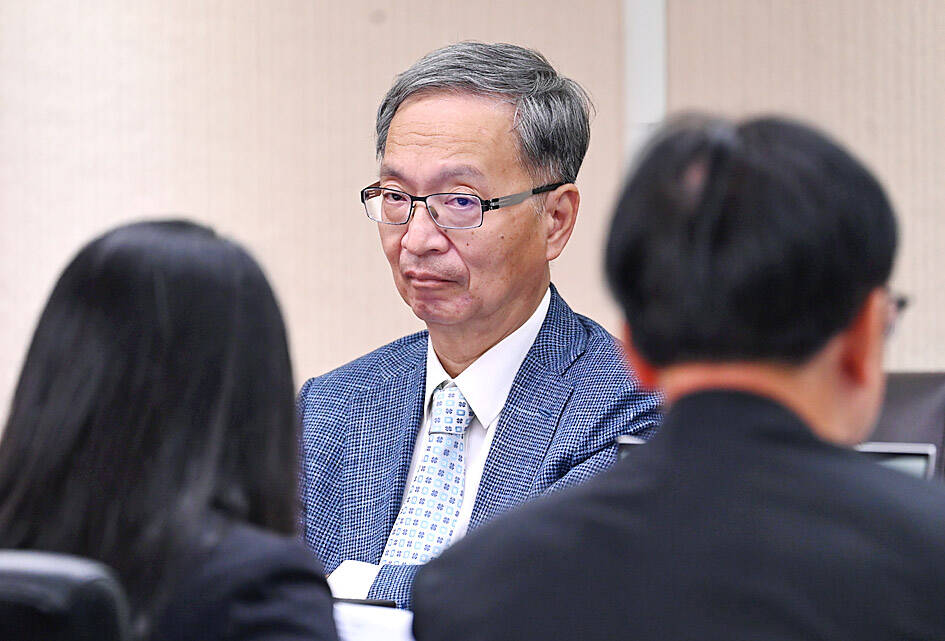With healthcare providers calling for a bill to guarantee the value of each National Health Insurance (NHI) point is at least NT$1, Minister of Health and Welfare Hsueh Jui-yuan (薛瑞元) yesterday said it might harm the NHI’s global budget payment system and should be further deliberated.
Chinese Nationalist Party (KMT) Legislator Su Ching-chuan (蘇清泉) and several other KMT legislators have proposed amending Article 62 of the National Health Insurance Act (全民健康保險法), adding a clause that says “when the [NHI] point value is less than NT$1, the government should supplement it to NT$1,” ensuring that a point equals at least NT$1.
The draft bill is scheduled to be reviewed today by the legislature’s Social Welfare and Environmental Hygiene Committee.

Photo: Liu Hsin-de, Taipei Times
Eight healthcare providers’ associations issued a statement on Tuesday expressing their support for the bill proposed by Su.
The statement said the current NHI global budget payment system forces healthcare facilities to bear the pressure of rising health insurance costs, so although the public is very satisfied with low medical costs, healthcare facilities are struggling to survive.
The NHI’s global budget payment system is an “expenditure cap” system with “floating” point values, used to precisely match the predetermined budget, as the total expenditure claimed by healthcare facilities for their services is reimbursed based on an adjusted amount — multiplied by the point value.
The non-fixed “floating” point value is retrospectively determined every three months after hospital claims are reviewed and it is negatively correlated with nationwide healthcare service volume, so a higher overall service volume leads to lower point value, as well as a lower payment for each service.
The statement said the point value had dropped to as low as between 0.6 and 0.8, which causes unreasonable payments to healthcare providers and is collapsing the NHI system.
Healthcare facilities are not like private businesses as hospitals only receive about 80 percent of NHI income and their medical fee standards are controlled by the health authorities, as well as the NHI global budget payment system’s predetermined “expenditure cap,” so they cannot increase charges or transfer the additional costs to patients, it said.
Facing rising costs and inflation, many healthcare providers are leaving their jobs due to lower salaries and many medical students are unwilling to take positions in departments with more difficult healthcare procedures, it added.
The statement said the law should be amended and the NHI’s global budget payment system changed from a “expenditure cap” system to a “expenditure target” system, meaning that when the point value is less than NT$1, the government should make up the deficit for sustainable development of the healthcare system.
The healthcare providers’ associations included the Taiwan Hospital Association, the Taiwan Medical Center Association, the Taiwan Regional Hospital Association, the Taiwan Community Hospital Association, the Taiwan Medical Association, the Taiwan Union of Nurses Association, the Taiwan Nongovernmental Hospitals and Clinics Association and the Taiwan College of Healthcare Executives.
Hsueh yesterday said that the bill might harm the NHI’s global budget payment system and the issue is unlikely to be adequately solved by only revising an article of the act, so it should be further deliberated.

An essay competition jointly organized by a local writing society and a publisher affiliated with the Chinese Communist Party (CCP) might have contravened the Act Governing Relations Between the People of the Taiwan Area and the Mainland Area (臺灣地區與大陸地區人民關係條例), the Mainland Affairs Council (MAC) said on Thursday. “In this case, the partner organization is clearly an agency under the CCP’s Fujian Provincial Committee,” MAC Deputy Minister and spokesperson Liang Wen-chieh (梁文傑) said at a news briefing in Taipei. “It also involves bringing Taiwanese students to China with all-expenses-paid arrangements to attend award ceremonies and camps,” Liang said. Those two “characteristics” are typically sufficient

A magnitude 5.9 earthquake that struck about 33km off the coast of Hualien City was the "main shock" in a series of quakes in the area, with aftershocks expected over the next three days, the Central Weather Administration (CWA) said yesterday. Prior to the magnitude 5.9 quake shaking most of Taiwan at 6:53pm yesterday, six other earthquakes stronger than a magnitude of 4, starting with a magnitude 5.5 quake at 6:09pm, occurred in the area. CWA Seismological Center Director Wu Chien-fu (吳健富) confirmed that the quakes were all part of the same series and that the magnitude 5.5 temblor was

The brilliant blue waters, thick foliage and bucolic atmosphere on this seemingly idyllic archipelago deep in the Pacific Ocean belie the key role it now plays in a titanic geopolitical struggle. Palau is again on the front line as China, and the US and its allies prepare their forces in an intensifying contest for control over the Asia-Pacific region. The democratic nation of just 17,000 people hosts US-controlled airstrips and soon-to-be-completed radar installations that the US military describes as “critical” to monitoring vast swathes of water and airspace. It is also a key piece of the second island chain, a string of

The Central Weather Administration has issued a heat alert for southeastern Taiwan, warning of temperatures as high as 36°C today, while alerting some coastal areas of strong winds later in the day. Kaohsiung’s Neimen District (內門) and Pingtung County’s Neipu Township (內埔) are under an orange heat alert, which warns of temperatures as high as 36°C for three consecutive days, the CWA said, citing southwest winds. The heat would also extend to Tainan’s Nansi (楠西) and Yujing (玉井) districts, as well as Pingtung’s Gaoshu (高樹), Yanpu (鹽埔) and Majia (瑪家) townships, it said, forecasting highs of up to 36°C in those areas